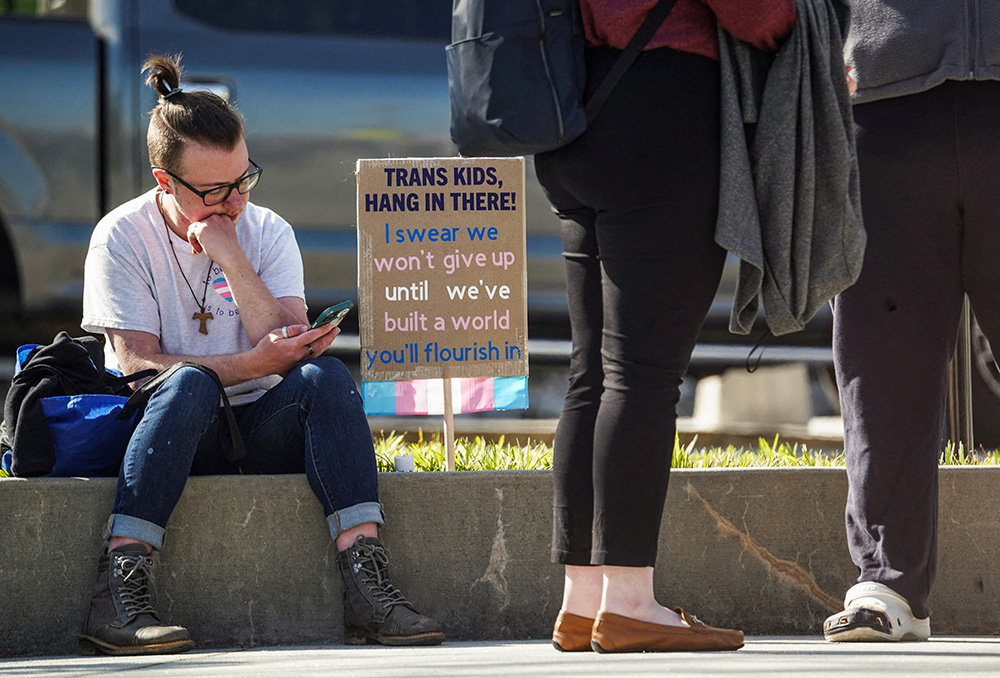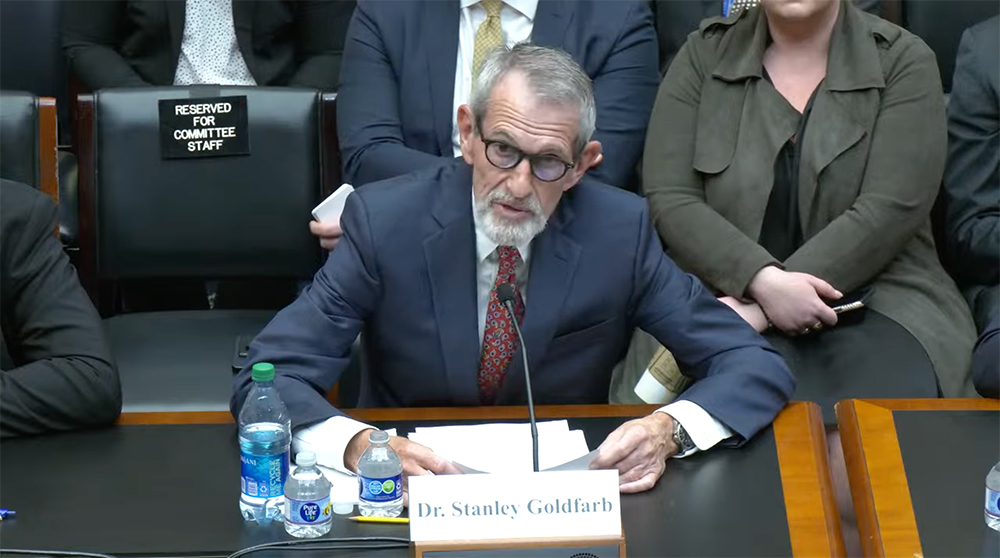
(Dreamstime/Sudok1)
Catholic hospitals are raising alarms about the accuracy of a conservative group's list of U.S. medical facilities that allegedly provided gender-affirming procedures to minors over a five-year period.
The list was compiled by an organization with backing from conservative Catholics and others who oppose gender-affirming interventions. At least three bishops have cited the group's work that claims such care was given by 28 Catholic health systems.
But the stated methodology of the group, Do No Harm, is being denounced for drawing potentially false conclusions from anonymous billing data on individuals — while even acknowledging separately that its own database might be incorrect.
The Catholic Health Association and independent specialists consulted by the National Catholic Reporter cited several problems:
- Some data relies on billing codes for treatments that are not only for gender transition but also non-transition-related medical conditions.
- The methodology does not indicate if the group took into account the age and sex of patients, variables that clarify if a prescription is for transitioning or a different medical reason.
- The group does not fully disclose where it obtained its data and lacks an objective peer review, both departures from scientific best practices.
Mercy Sr. Mary Haddad, president and CEO of the Catholic Health Association, sent a memo to association members listing "errors and inaccuracies in the database." The Oct. 30 memo, which has not previously been made public and was reviewed by the National Catholic Reporter, echoes critiques of medical specialists who examined the database for NCR.
Dominican Fr. Charles Bouchard, a liaison between the bishops and the Catholic Health Association for seven years until he retired last year, said he is unaware of any gender-affirming surgeries on minors at Catholic facilities during his tenure.
NCR asked Do No Harm for a response to the criticisms. The group defended its methodology, but its response did not address specific questions about that methodology.
Advertisement
Bishop Thomas Daly of Spokane, Washington, has called for a special bishops meeting to discuss the so-called violations of Catholic medical ethics in the report, and Bishop James Conley of Lincoln, Nebraska, cited the data in his recent column. "Woe to Catholic individuals and institutions who poison and mutilate children," Conley wrote.
The database was released as Donald Trump made transgender-related policies a key issue in his presidential campaign, condemning trans rights in speeches at rallies and in hundreds of television advertisements in battleground states.
Attention to the group's findings comes as the bishops' doctrine committee is working to update its Ethical and Religious Directives, which are binding for the large network of U.S. Catholic health care facilities. Revisions are expected to reflect a doctrinal note issued last year rejecting interventions that "transform the sexual characteristics of a human body into those of the opposite sex."
The directives do not currently address gender-affirming care, but Catholic hospitals generally have taken a conservative approach, and they do not perform procedures impairing fertility.
Catholic health leaders, who asked not to be named because of the sensitivity of the issue, told NCR they were concerned assertions made by Do No Harm were inaccurate and could harm an already vulnerable population.

A young demonstrator sits during a protest rally outside the Georgia Capitol in Atlanta March 20, 2023, after the state House and Senate voted to prohibit most surgeries and hormone replacement therapies for minors seeking to change their gender. Georgia's governor subsequently signed the bill into law. (OSV News/Reuters/Megan Varner)
Trans advocates worry the database could be used to support draconian rules in the updated ethical directives.
Do No Harm, a nonprofit advocacy group working to ban gender-affirming care nationwide, is primarily bankrolled by conservative groups, among them a fund tied to Catholic and judicial activist Leonard Leo.
The nonprofit released the findings in October in a state-by-state dashboard. The data allegedly shows that nearly 14,000 minors received gender-affirming treatments at hospitals, including some at Catholic facilities, between 2019 and 2023. In a news release, Dr. Stanley Goldfarb, founder of Do No Harm, said the data show "the pervasiveness of irreversible sex-change treatments for minors in America."
There are about 300,000 minors in the United States ages 13-17 who identify as transgender, according to the Williams Institute, a research center at the University of California Los Angeles School of Law. Based on that figure and Do No Harm numbers, 2.9% of trans youths nationwide would have received hormones and puberty blockers at hospitals over the five-year period; 1.9 % would have undergone surgeries.
Do No Harm's published methodology says data was compiled by first collecting procedure and medication codes related to gender-affirming care. These codes were then cross-referenced with patient diagnosis codes for relevant conditions to determine which treatments were used for gender-affirming medical interventions. All the codes are for billing.
While claims data commonly are used to assess health care, in this case "a lot of things make the database scientifically very suspect," said Dr. Jane Liebschutz, director of the Center for Research on Health Care at the University of Pittsburgh.
There are treatments listed in the group's methodology that are provided to patients for many reasons, 'some of which are not sex-specific and have nothing to do with transition,' said Catholic psychologist Julia Sadusky.
Using claims data is most accurate when it looks at trends and the big picture, not when it homes in on a specific hospital, as the group's dashboard does. And such studies need to be vetted by experts. Otherwise, according to Dr. Peter Smith, an associate professor of pediatrics in the University of Chicago's Department of Pediatrics, they can be "riddled with errors."
Julia Sadusky, a Catholic psychologist who has reservations about gender-affirming medical interventions, especially for minors, flagged several potential problems in the report.
There are treatments listed in the group's methodology that are provided to patients for many reasons, "some of which are not sex-specific and have nothing to do with transition," Sadusky said.
Liebschutz agreed. For example, "reshaping of tip of nose" is listed in the group's report. "That's a nose job," Liebschutz said. "Hair removal by electrolysis" could be a teen eliminating unwanted hair growth.
Likewise, there are medications that are "not used specifically for transition," said Dr. Cynthia Herrick, who specializes in endocrinology and is co-director of a gender medicine clinic in St. Louis.
Birth-control agents are listed in Do No Harm's methodology, including Depo-Provera and Sprintec. While they both contain hormones used in gender-affirming care, they are not medications typically prescribed to treat transgender women, Herrick said. They are used for contraception or painful periods.
Do No Harm does not explain if it took into account the age or sex of patients. That's a problem because the same drug prescribed as a puberty blocker for a 9-year-old transgender-identifying youth could be used to treat precocious puberty in a 5-year-old. Depo-Testosterone can be used for gender transition but is also prescribed for men and boys to treat conditions caused by a lack of the hormone.

Dr. Stanley Goldfarb, founder of Do No Harm, testifies at a hearing of the U.S. House Subcommittee on Higher Education and Workforce Development March 7 in Washington, D.C. (NCR screenshot/YouTube/House Committee on Education & the Workforce)
After NCR sent Do No Harm questions about its methodology, Goldfarb shared a statement that reiterated its methodology.
Goldfarb said that due to the "cautious and conservative nature" of the methodology and the lack of certain insurance claims data, the actual number of children subjected to the "often harmful sex change procedures" is likely much higher.
Do No Harm said that it linked diagnosis codes with procedure and prescription codes to establish that potentially ambiguous treatments were related to gender dysphoria.
However, medical specialists cited problems with those assumptions when they are not coupled with expert vetting. "I cannot stress enough the number of times medical providers hastily slap a diagnosis onto things," said Sadusky. At the same time, more young people are identifying as trans or nonbinary, she said, so a provider may list gender dysphoria as a diagnosis and the code "may not in any way" be related to their treatment.
Additionally, the methodology states it takes into account any prescriptions written within 90 days of the individual receiving a diagnosis related to gender dysphoria, to accommodate "potential delays in claim processing."
But a diagnosis of gender dysphoria 90 days from when someone receives a prescription does not automatically mean the two are linked, Herrick said.
Overall, the database is 'largely an overcount of surgical procedures and medications,' said Dr. Jane Liebschutz.
There are a number of surgery codes used by the group — for instance "Intersex surgery; male to female" — clearly linked to gender affirming care, said Liebschutz. Yet to increase confidence that a surgery was performed for gender affirmation, experts told NCR, the primary diagnostic code associated with the procedure code would need to be for gender dysphoria or a related diagnosis. Nowhere in the methodology does it indicate only the primary diagnostic code was used.
The Catholic Health Association memo notes that in some instances a transgender patient receiving care unrelated to their transition could be lumped into the group's data and used to draw an erroneous conclusion.
Overall, the database is "largely an overcount of surgical procedures and medications," said Liebschutz.
The methodology essentially acknowledges it may have conflated the data in this disclaimer: "Caution should be exercised when interpreting the data, as these codes may capture a broader range of medical treatments beyond the scope of gender transition procedures."
Do No Harm then contradicts itself in its promotion of the database, stating without caveats that puberty blockers and surgical interventions are irreversibly harming children at the listed hospitals.
Though the methodology claims the findings were "peer reviewed," medical specialists told NCR they would not consider the report peer-reviewed because there was no outside, impartial organization adjudicating.
It is also unclear where the group obtained its data. According to the methodology, billing data was sourced from an "all-payer claims database" that incorporated data from various places.
Some states have all-payer claims databases — large databases comprising payment data from commercial and public health insurers — and a federal agency has Medicaid and Medicare data. Claims data also is sold by commercial insurance databases and analytics firms.
The sourcing as shared in the methodology would "not pass muster with any kind of peer-reviewed process," said Theresa Shireman, a longtime health services researcher and professor in the School of Public Health at Brown University. "It's gobbledygook."








